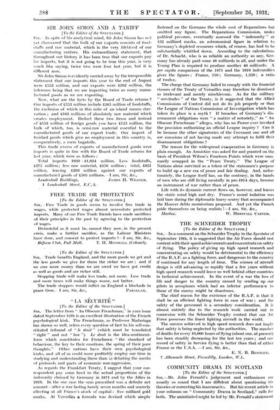" LA SECURITE "
[To the Editor of the SPECTATOR.]
Soa,---'Flie letter from " An Obscure Frenchman," in your issue dated September 12th is an excellent illustration of the French psychological kink. The Frenchman, as Professor Madariaga has shown so well, refers every question of fact to his self-con- stituted tribunal of " le droll" (which must be translated " right " and not " law "). Le droit is the idea-sentiment- force which constitutes for Frenchmen- " the standard of behaviour, the key to their emotions, the spring of their pure thoughts." Other nations have their own psychological kinks, and all of us could more profitably employ our time in studying and understanding them-than in debating the merits of protocols and pacts of economic non-aggression. • As regards' the Frankfurt Treaty, I suggest that-your cor- respondent pay some heed to 'the actual proportions of the indemnity claimed by Germany in 1871 and by the Allies in 1919. In the one case the sum prescribed was a definite net amount—after a war lasting barely seven months and scarcely affecting at all France's stock of capital , five milliard gold marks. At Versailles a formula was devised- which simply fastened on the Germans the whole cost of Reparations but omitted 'any figure: The Reparations Commission, under political pressure, eventually assessed the " indemnity " at 132 milliard marks, an astronomical figure in relation to Germany's depleted resources which, of course, has had to be substantially whittled down. According to the calculations of Dr. Schacht, who is as reliable an authority as -any, Ger- many has already paid some 48 milliards in all, and under the Young Plan is required to produce another 40 milliards: A: per capita comparison of the 1871 and the 1919 indemnities gives the figures : France, 110 ; Germany, 1,350 ; a ratio of twelve.
The charge that Germany failed to comply with the financial clauses of the Treaty of Versailles may therefore be dismissed as irrelevant and merely mischievous. As for the military " servitudes " of the Treaty, is it suggested that the Allied Commissions of Control did -not do its job properly or -that the League of Nations Commission of Investigation which has taken its place is a myth ? If breaches of Germany's dis- armament obligations were " a matter of notoriety," as "An Obscure Frenchman " alleges, why has no Power ever invoked the provision authorizing an official League inquiry ? Can it be because the other signatories of the Covenant one and all are conscious of not having made any attempt to fulfil their disarmament obligations ?
The reason for the widespread exasperation in Germany is plain enough. An Armistice was asked for and granted on the basis of President Wilson's Fourteen- Points which were sum- marily scrapped in the " Peace Treaty." The League of Nations alone survived as a token of the statesmen's purpose to build up a new era of peace and fair dealing. And, unfor- tunately, the League itself has, on the contrary, in the hands of men who are still living mentally in pre-1914 days, become an instrument of war rather than of peace. - • Life with its dynamic current flows on, however, and leaves the static mind high and dry. France's moral isolation was laid bare during the diplomatic hurry-scurry that accompanied the Hoover debts moratorium proposal. And yet the French pride themselves on being realists !—I am, Sir, &c.,


































 Previous page
Previous page